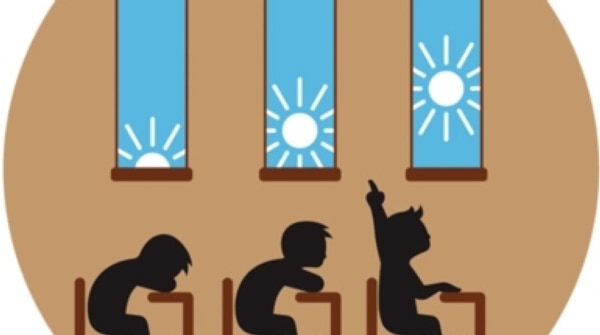School’s start time should be pushed back

March 24, 2022
Imagine this. You walk into your first-period class. Suddenly, another student walks in with a Monster drink in their hand. Another has a cup of iced coffee on their desk. Everyone’s showing up in messy sweatshirts and sweatpants. Some people still have wet hair from the shower. When the teacher starts to explain something or asks a question, the class simply stares back with a blank look on their faces.
I would be shocked if what I’m describing isn’t an account of many first-period classes at our school right now. Abington loves to teach us to value science, but they themselves are not following the scientific evidence concerning the high school’s start time.
The problem with the school start time is not the amount of sleep that it allows for. Regardless of when school starts, students have control over how much sleep they get.
In order to grasp the real issue with this incredibly early start time, one must understand the concept of circadian rhythms- the biological clocks of our bodies. Every person’s circadian rhythm is slightly different, which explains where the terms “morning lark” and “night owl” come from. However, certain age groups tend to have commonalities in their sleep patterns. Younger kids and senior citizens are notorious for being “early to bed, early to rise.” On the contrary, during puberty, teenagers’ circadian rhythms are shifted back by a few hours. This results in them naturally feeling tired later into the night and taking longer to wake up in the morning.
This circadian shift has huge logistical implications. Imagine that you’re a student trying to get to school on time. 1st period starts at 7:35 AM, so let’s say you wake up at around 6:30 AM, depending on how you get transported to school. If we are to assume that teenagers need at least eight hours of sleep a night (the CDC recommends 8-10 hours), then that means that you should be going to bed around 10:30 PM. For many high school students, this early bedtime is not compatible with their biological clock. They may lie in bed and try to fall asleep, but their body won’t secrete enough melatonin for them to do so. These adolescent circadian rhythms also affect how students act in the morning hours. A student getting eight hours of sleep a night might still be tired in the morning because according to their circadian rhythm, their body should still be in “sleep mode.”
These sleep cycle issues are the main reason why the CDC identifies that 7 out of 10 teenagers are in a chronic sleep deficit, and why the CDC, American Psychology Association, and American Academy of Pediatrics all advocate for later school start times.
In light of the scientific consensus surrounding this topic, many other districts around the country are pushing back their start times. Sadly, Abington has not chosen to follow suit, maintaining their strict 7:35 AM start time. This is absolutely baffling. The district and school board were extremely rigid in following the CDC guidelines in regards to the COVID-19 pandemic, and yet they seemingly choose to ignore the recommendations in this crucial area.
I don’t think I need to spell out why students getting enough sleep is important. Sleep is vital to academic performance, physical and mental development, and social and emotional wellbeing. I do, however, understand why there might be pushback against moving the start time back. There are a few potential arguments that I would like to dissuade.
I have heard that altering the school start time would complicate the current bus schedule. As of now, the timing is set up so that buses can pick up students from the Senior High, then the Junior High, and finally the elementary schools. If the school start time for the Senior High was pushed back, then we would effectively have to push all of the start times back as well. However, there seems to be a logical solution to this issue: swap the Senior High’s start time with either the Junior High’s or the Elementary Schools’. The younger kids’ circadian rhythms are more suited to an early start time, so the change seems like it would be a win-win all around.
The other common argument is that pushing back school start times would cut into time for after-school activities. I don’t understand why this would need to be the case though. If school start-time gets pushed back, couldn’t sports and other activities simply be pushed back as well? Sure, a student might end up getting home at 6:00 PM instead of 5:00 PM, but they would also be able to go to bed an hour later, so it would all balance out. Furthermore, even if moving the start time ended up taking away time from clubs and activities, the change would still be worth it. The school’s primary job is to educate. If moving the school start time would dramatically increase the quality of our education, then the ramifications for after-school activities should be of minor concern. It is more important to prioritize the health, education, and wellbeing of us, students.
There’s one additional benefit to moving back the school start time that I feel has been overlooked. Students being half-asleep in the morning impacts not only the classroom but also the safety of our roads. Many high school students drive themselves to school or are driven by other students. And as we all have seen, some of us aren’t exactly phenomenal drivers. When we’re tired, this problem is exacerbated. Driving sleep-deprived has been proven to have similar effects as driving drunk. With this in mind, does having teenagers driving themselves to school at 7:00 AM really seem like the wisest idea? Add on the fact that many students are rushing to get to class on time, and it seems to me like an accident waiting to happen.
Between the remodeling of the high school, the shifting of certain grades to different buildings, and the switch to block scheduling, there are a lot of district-wide changes in the works right now. I can only hope that as the district considers these new implementations and seeks to improve the experiences of students, they will also reexamine the high school’s current start time.

